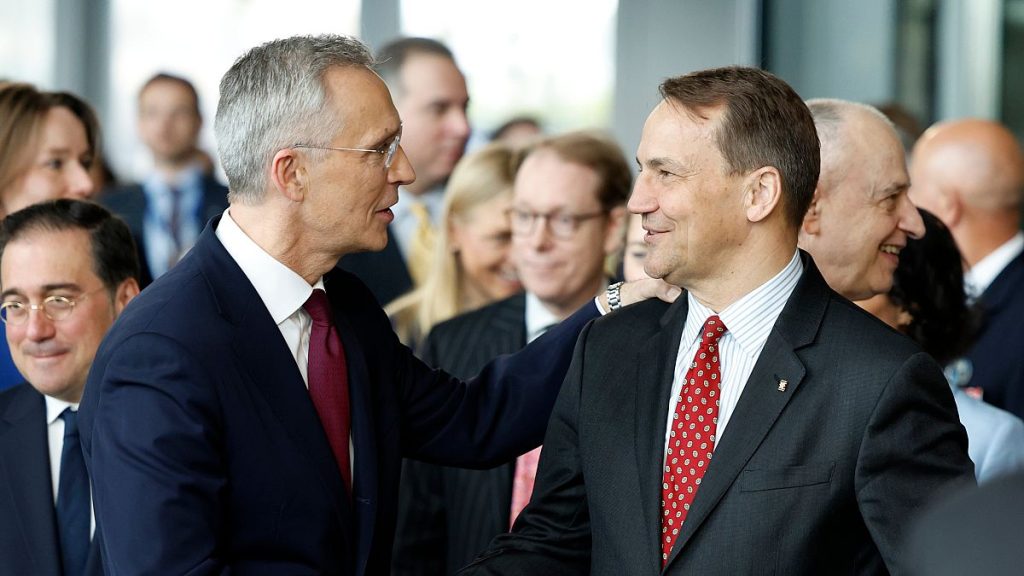Poland’s Foreign Minister Radek Sikorski emphasized the need for NATO to upgrade its defenses in response to potential Russian aggression. He stated that while a Russian attack on NATO would result in defeat for Moscow, it is essential for NATO to strengthen its defenses. Sikorski explained that Poland’s foreign policy priorities have shifted since Prime Minister Donald Tusk’s government came into power, aiming to align more closely with the group of countries that set the agenda for the European Union. The previous Law and Justice party government, which stressed ties with the US, took a confrontational stance towards the EU and Germany. In contrast, Sikorski emphasized the importance of trans-Atlantic cooperation, European integration, and friendship with Germany for Poland’s development and security.
Poland, as a member of NATO and the EU, occupies a strategic position on the eastern flank of both organizations with borders shared with Russia, Belarus, and Ukraine. The country serves as a crucial hub for Western weapons being sent to Ukraine. In light of the increasing tensions in the region, Poland’s government is focused on enhancing its defense capabilities and strengthening its partnerships with NATO allies. The recent visit of NATO Secretary General Jens Stoltenberg and British Prime Minister Rishi Sunak to Poland resulted in announcements of increased military aid for Ukraine and commitments from the UK to spend 2.5% of its GDP annually on defense by the end of the decade. These developments underscore Poland’s efforts to bolster its security and contribute to broader security initiatives in the region.
Sikorski’s speech highlighted the shift in Polish foreign policy towards a more collaborative and integrated approach with European and trans-Atlantic partners. The emphasis on maintaining strong ties with both the EU and NATO reflects Poland’s recognition of the interconnectedness of regional security and global challenges. By stressing the importance of cooperation and friendship with Germany, Sikorski condemned the previous government’s confrontational stance and advocated for a more harmonious relationship with neighboring countries. This diplomatic realignment signals Poland’s commitment to working with allies to address common threats and reinforce collective defense capabilities in the face of external pressures.
Poland’s geographical location and historical ties make it a critical player in European security dynamics, particularly in the context of rising tensions with Russia and ongoing conflict in Ukraine. The country’s proximity to potential areas of conflict underscores the need for robust defense measures and strategic partnerships with key allies. By positioning itself as a key contributor to regional security efforts, Poland seeks to play a proactive role in shaping the security landscape of Eastern Europe and strengthening the cohesion of NATO and the EU. The government’s focus on enhancing defense capabilities and fostering diplomatic relations reflects a comprehensive approach to addressing security challenges and promoting stability in the region.
The recent interactions with NATO and British officials underscore Poland’s commitment to strengthening its ties with key regional and international partners. By hosting high-level visits and engaging in discussions on military aid and defense spending commitments, Poland demonstrates its proactive approach to enhancing collective security efforts. The announcements of increased support for Ukraine and commitments to defense spending reflect Poland’s willingness to contribute to broader security initiatives and uphold its obligations as a member of NATO and the EU. These developments highlight Poland’s evolving role as a proactive and engaged participant in regional security cooperation, with a focus on enhancing defense capabilities and fostering strong partnerships with allies.
In conclusion, Poland’s foreign policy priorities under the leadership of Prime Minister Tusk’s government reflect a strategic reorientation towards closer collaboration with European and trans-Atlantic partners. The emphasis on strengthening defense capabilities, enhancing regional security cooperation, and fostering diplomatic relations underscores Poland’s commitment to addressing common threats and promoting stability in the region. By engaging with key allies, enhancing military aid for Ukraine, and committing to increased defense spending, Poland seeks to play a proactive role in shaping the security landscape of Eastern Europe and contributing to broader security initiatives. As a key member of NATO and the EU, Poland’s evolving role as a proactive and engaged participant in regional security cooperation underscores its commitment to upholding its obligations and safeguarding regional stability.


